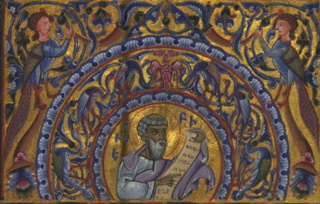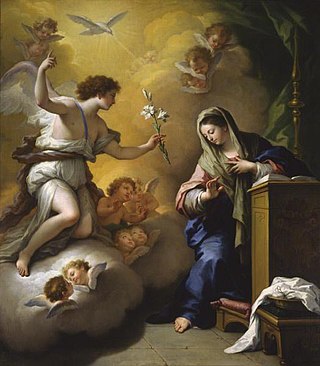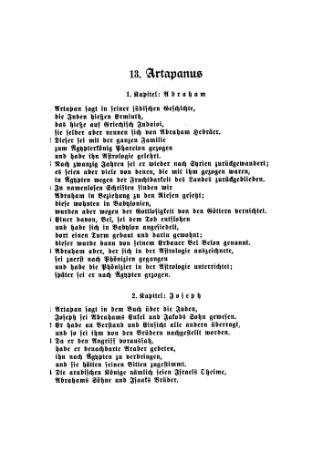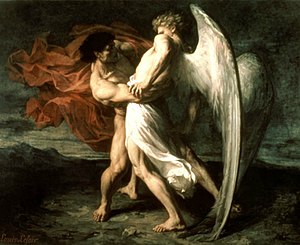Manuscript tradition and Provenance
Only three fragments have survived of the Prayer of Joseph: Fragment A, which is the longest, was preserved in Origen's "Commentary on the Gospel of John"- Book 2.31(25).186-192. Fragment B, a single sentence, has been found in the Praeparatio Evangelica - Book VI , of Eusebius of Caesarea as well as in the Commentary on Genesis of Procopius of Gaza and in an anthology of the writings of Origen compiled by Saint Basil the Great and Saint Gregory Nazianzus usually named Philokalia . Fragment C, also found in Philokalia, paraphrases the other fragments. The title itself Prayer of Joseph is found in many ancient documents. The Stichometry of Nicephorus shows that the Prayer of Joseph had a length of eleven hundred lines, thus only a very short part has survived. [3] : 699
Due to the shortness of the extant text, it is almost impossible to determine the provenance. Some scholars suggest it should be considered Jewish-Christian, others gnostic, others Jewish anti-Christian, others Christian anti-Jewish, while the probable thesis according to J. Z. Smith and others is that Origen was right to consider it Jewish. [3] : 700

Eusebius of Caesarea, also known as Eusebius Pamphilus, was a Greek historian of Christianity, exegete, and Christian polemicist. In about AD 314 he became the bishop of Caesarea Maritima in the Roman province of Syria Palaestina. Together with Pamphilus, he was a scholar of the biblical canon and is regarded as one of the most learned Christians during late antiquity. He wrote Demonstrations of the Gospel, Preparations for the Gospel and On Discrepancies between the Gospels, studies of the biblical text. As "Father of Church History", he produced the Ecclesiastical History, On the Life of Pamphilus, the Chronicle and On the Martyrs. He also produced a biographical work on Constantine the Great, the first Christian Roman emperor, who was augustus between AD 306 and AD 337.

Jacob, later given the name Israel, is regarded as a patriarch of the Israelites and is an important figure in Abrahamic religions, such as Judaism, Christianity, and Islam. Jacob first appears in the Book of Genesis, where he is described as the son of Isaac and Rebecca, and the grandson of Abraham, Sarah, and Bethuel. According to the biblical account, he was the second-born of Isaac's children, the elder being Jacob's fraternal twin brother, Esau. Jacob is said to have bought Esau's birthright and, with his mother's help, deceived his aging father to bless him instead of Esau. Later in the narrative, following a severe drought in his homeland of Canaan, Jacob and his descendants, with the help of his son Joseph, moved to Egypt where Jacob died at the age of 147. He is supposed to have been buried in the Cave of Machpelah.

Judaism considers some names of God so holy that, once written, they should not be erased: יהוה, אֲדֹנָי (Adonai), אֵל, אֱלֹהִים, אֵל שַׁדַּי, שַׁדַּי, יְהֹוָ֥ה צְבָאֽוֹת and צְבָאֽוֹת ; some also include I Am that I Am. Early authorities considered other Hebrew names mere epithets or descriptions of God, and wrote that they and names in other languages may be written and erased freely. Some moderns advise special care even in these cases, and many Orthodox Jews have adopted the chumras of writing "G-d" instead of "God" in English or saying Ṭēt-Vav instead of Yōd-Hē for the number fifteen or Ṭēt-Zayin instead of Yōd-Vav for the Hebrew number sixteen.

Archangels are the second-lowest rank of angel in the Christian hierarchy of angels, put forward by Pseudo-Dionysius the Areopagite in the 5th or 6th century in his book De Coelesti Hierarchia. The word "archangel" itself is usually associated with the Abrahamic religions, but beings that are very similar to archangels are found in a number of other religious traditions.

In Jewish and Christian traditions, Jannes and Jambres are the names given to magicians mentioned in the Book of Exodus. This naming tradition is well-attested in ancient and medieval literature. In Latin manuscripts of the New Testament, and in Latin writing traditions, their names are known as Jamnes and Mambres.

Elohim, the plural of אֱלוֹהַּ, is a Hebrew word meaning "gods" or "godhood". Although the word is plural, in the Hebrew Bible it most often takes singular verbal or pronominal agreement and refers to a single deity, particularly the God of Israel. In other verses it refers to the singular gods of other nations or to deities in the plural.

The Book of Enoch is an ancient Hebrew apocalyptic religious text, ascribed by tradition to the patriarch Enoch who was the great-grandfather of Noah. The Book of Enoch contains unique material on the origins of demons and Nephilim, why some angels fell from heaven, an explanation of why the Genesis flood was morally necessary, and a prophetic exposition of the thousand-year reign of the Messiah. Three books are traditionally attributed to Enoch, including the distinct works 2 Enoch and 3 Enoch. None of the three books are considered to be canonical scripture by the majority of Jewish or Christian church bodies.

Uriel, Auriel or Oriel is the name of one of the archangels who is mentioned in the post-exilic rabbinic tradition and in certain Christian traditions. He is well known in the Russian Orthodox tradition and in folk Catholicism and recognized in the Anglican Church as the fourth archangel. He is also well known in European esoteric medieval literature. Uriel is also known as a master of knowledge and archangel of wisdom.
Eupolemus is the earliest Hellenistic Jewish historian whose writing survives from Antiquity. Five fragments of his work have been preserved in Eusebius of Caesarea's Praeparatio Evangelica, embedded in quotations from the historian Alexander Polyhistor, and in the Stromata of Clement of Alexandria.

A Watcher is a type of biblical angel. The word occurs in both plural and singular forms in the Book of Daniel, where reference is made to the holiness of the beings. The apocryphal Books of Enoch refer to both good and bad Watchers, with a primary focus on the rebellious ones.

Jacob wrestling with the angel is described in the Book of Genesis. The "angel" in question is referred to as "man" (אִישׁ) and "God" in Genesis, while Hosea references an "angel" (מַלְאָךְ). The account includes the renaming of Jacob as Israel.

The Testaments of the Twelve Patriarchs is a constituent of the apocryphal scriptures connected with the Bible. It is believed to be a pseudepigraphical work of the dying commands of the twelve sons of Jacob. It is part of the Oskan Armenian Orthodox Bible of 1666. Fragments of similar writings were found at Qumran, but opinions are divided as to whether these are the same texts. It is generally considered apocalyptic literature.
Sons of God is a phrase used in the Tanakh or Old Testament and in Christian Apocrypha. The phrase is also used in Kabbalah where bene elohim are part of different Jewish angelic hierarchies.

The angel of the LORD is an entity appearing repeatedly in the Hebrew Bible on behalf of the God of Israel.

Artapanus of Alexandria was a historian, of Alexandrian Jewish origin, who is believed to have lived in Alexandria, during the later half of the 3rd or 2nd century BCE. Although most scholars assume Artapanus lived in Alexandria, others argue he resided in the countryside. Regardless, Artapanus lived in Egypt.

The concept of Seven Archangels is found in some works of early Jewish literature and in Christianity. In those texts, they are referenced as the angels who serve God directly.
In Judaism, angels are supernatural beings that appear throughout the Tanakh, rabbinic literature, apocrypha and pseudepigrapha, and traditional Jewish liturgy as agents of the God of Israel. They are categorized in different hierarchies. Their essence is often associated with fire. The Talmud describes their very essence as fire.

Ariel is an angel found primarily in Jewish and Christian mysticism and apocrypha.

The Tetragrammaton, or the Tetragram, is the four-letter Hebrew theonym יהוה, the name of God in the Hebrew Bible. The four letters, written and read from right to left, are yodh, he, waw, and he. The name may be derived from a verb that means "to be", "to exist", "to cause to become", or "to come to pass". While there is no consensus about the structure and etymology of the name, the form Yahweh is now accepted almost universally, though the vocalization Jehovah continues to have wide usage.
Demetrius the Chronographer was a Jewish chronicler (historian) of the late 3rd century BC, who lived probably in Alexandria and wrote in Greek.
















